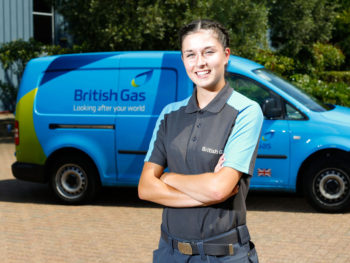Case Study: How British Gas slashed collision rates and fuel costs
With entries now open for this year’s Energy Saving Trust Fleet Heroes awards, we take a look back at the innovations that earned last year’s winners top honours.
One of the most prominent fleets on our roads, British Gas operates a high-profile fleet of over 11,000 vans which cover nearly 111 million miles each year, and consume over 16.9 million litres of fuel. Its work to dramatically reduce collision rates and fuel costs provides an example of how fleets can emulate its results.
Following the launch of its Young Driver Academy (YDA) in 2014, British Gas have seen a remarkable fall in collision rates, a drop in fuel use and saved millions on repair costs – while improving the safety of its employees and other road users.
The programme was launched after analysis identified under 25s as the single biggest risk group and is a mandatory 12-month apprenticeship programme produced by Fleetmaster and is the largest scheme of its kind, with 1,400 participants.
Previously only drivers involved in an incident or with penalty points received training. The YDA programme comprises nine units, delivered during six ‘on the job’ half day visits. Units include efficient route planning, manoeuvring the van in restricted spaces, fuel efficiency, and correct loading. Targets are set at the end of every visit on specific areas of driving, and monitored at the next one.
Fuel efficiency, or Ecodriving training, is a key part of the YDA and goes hand-in-hand with safety due to its strong focus on encouraging greater anticipation and reading the road. The Ecodriving element of the training follows the format developed and approved by EST, and is subsidised by EST, through funding from the Department of Transport.
Once all nine units have been completed, a portfolio of work is submitted for external evaluation and drivers achieve a Level 2 Driving Goods Vehicles Apprenticeship (Van Driver Pathway). Overall, drivers develop better road and hazard awareness, practical driving skills and better understand the importance of fuel efficiency and safety checks. There is an emphasis on developing a positive, confident attitude.
Supporting the on-the-road training is an in-van telematics system which monitors harsh manoeuvres (including speed, acceleration, braking and cornering) and generates safety scores, allowing learning priorities to be continually picked up and feedback given. Smartphone apps also enable drivers to monitor their own safety scores and undertake weekly walk-around vehicle checks.
Smartphone apps also enable drivers to monitor their own safety scores and undertake weekly walk-around vehicle checks
The results:
Since introducing the telematics systems and Young Driver Academy in 2014, British Gas has seen a:
- 14% reduction in fuel consumption and reduced vehicle wear-and-tear
- sharp fall in young drivers involved in at-fault incidents, from 45% in 2013 to 4%
- 30% reduction overall in collision rates, despite fleet growth
- 18% lower commercial vehicle incident rate than the national average
- 56% reduction in avoidable claims from under 25 drivers, equating to a 79% cost saving
- 19% fall in unavoidable claims, equating to an 83% cost saving.
Be a Fleet Hero:
Taking place on 27th November, The Fleet Heroes Awards seeks to recognise the organisations delivering cleaner, more efficient fleets through innovation, technology and fresh approaches to transporting people and goods.
To enter, submit your application via http://fleetheroes.org.uk/enter-now before 1 October.













